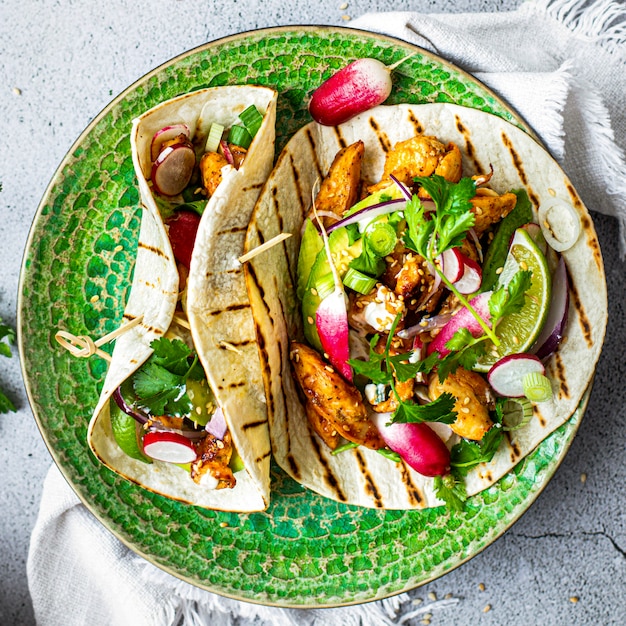Gut Health: Understanding Probiotics, Prebiotics, and Maintaining a Healthy Digestive System

A healthy gut is the cornerstone of overall wellness, influencing everything from digestion and nutrient absorption to immunity and mental health. Gut health hinges on maintaining a balance of beneficial bacteria in our digestive system, which can be achieved by understanding the roles of probiotics, prebiotics, and adopting gut-friendly habits. Let’s dive into the essentials of gut health and how you can maintain a thriving digestive system.
Understanding the Gut Microbiome
The gut microbiome is a complex community of trillions of microorganisms, including bacteria, fungi, and viruses, that live in your digestive tract.
These microorganisms play a crucial role in:
1. Breaking down food and absorbing nutrients
2. Supporting the immune system
3.Producing vitamins (e.g., B vitamins and vitamin K)
4. Regulating metabolism
5. Protecting against harmful pathogens
Maintaining a healthy balance of these microbes is essential for optimal digestive health, and probiotics and prebiotics play a significant role in supporting this balance.
Probiotics: The Friendly Bacteria
Probiotics are live beneficial bacteria that help maintain the balance of gut flora. They can replenish and restore good bacteria, especially after disruptions such as illness, antibiotic use, or poor diet.
Sources of Probiotics:
1. Yogurt: Contains live cultures such as Lactobacillus and Bifidobacterium.
2. Kefir: A fermented milk drink rich in probiotics.
3. Sauerkraut: Fermented cabbage loaded with lactic acid bacteria.
4. Kimchi: A spicy, fermented Korean dish made from cabbage and other vegetables.
5. Miso: A fermented soybean paste commonly used in Japanese cuisine.
6. Tempeh: Fermented soybeans with a firm texture.
7. Kombucha: A fermented tea drink rich in probiotics.
Health Benefits of Probiotics:
1. Improves Digestion: Helps break down food and supports nutrient absorption.
2. Boosts Immunity: Strengthens the gut barrier to protect against harmful pathogens.
3. Reduces Irritable Bowel Syndrome (IBS) Symptoms: Helps manage symptoms like bloating, gas, and diarrhea.
4. Enhances Mental Health: Supports the gut-brain connection, potentially improving mood and reducing anxiety.
Tip: Include a variety of fermented foods in your diet to introduce different strains of probiotics for maximum gut health benefits.
Prebiotics: The Fuel for Good Bacteria
Prebiotics are non-digestible fibers that feed and nourish the beneficial bacteria in your gut. They promote the growth of probiotics and help maintain a balanced gut environment.
Sources of Prebiotics:
1. Garlic: Contains inulin, a type of prebiotic fiber.
2. Onions: Rich in inulin and fructooligosaccharides (FOS).
3. Bananas: Especially green bananas, contain resistant starch that feeds gut bacteria.
4. Asparagus: High in prebiotic fibers that promote healthy bacteria.
5. Chicory Root: One of the richest sources of inulin; often used as a coffee substitute.
6. Jerusalem Artichokes: Packed with inulin, making them excellent prebiotic sources.
7.Whole Grains: Oats, barley, and wheat bran provide prebiotic fibers.
Health Benefits of Prebiotics
Supports Digestive Health: Promotes the growth of beneficial bacteria, improving digestion.
1. Enhances Calcium Absorption: Helps in mineral absorption, promoting bone health.
2. Regulates Blood Sugar: Helps maintain healthy blood sugar levels.
3. Boosts Immunity: Strengthens the gut barrier and supports immune function.
Tip: Aim to include a variety of prebiotic-rich foods in your daily diet to ensure your gut bacteria stay well-fed and healthy.
Maintaining a Healthy Digestive System
Apart from consuming probiotics and prebiotics, adopting gut-friendly habits can significantly improve your digestive health.
Here are some tips to maintain a healthy gut:
1. Eat a Balanced, Fiber-Rich Diet
Fiber: Include both soluble and insoluble fiber (fruits, vegetables, legumes, whole grains) to support digestion and regular bowel movements.
Variety: Incorporate a diverse range of plant-based foods to feed different strains of gut bacteria.
2. Stay Hydrated
Water is essential for digestion and helps maintain the mucosal lining of the intestines. Drink at least 8 glasses of water daily to support gut health.
3. Manage Stress
Stress negatively impacts the gut-brain connection and can lead to digestive issues. Incorporate stress-reducing activities such as meditation, deep breathing exercises, or spending time in nature.
4. Get Enough Sleep
Poor sleep can disrupt the gut microbiome. Aim for 7-9 hours of quality sleep per night to support a healthy digestive system.
5. Exercise Regularly
Physical activity promotes healthy digestion and increases the diversity of gut bacteria. Aim for at least 30 minutes of moderate exercise most days of the week.
6. Limit Processed Foods and Sugar
Excessive intake of processed foods, refined sugars, and artificial sweeteners can harm gut bacteria and lead to imbalances. Opt for whole, nutrient-dense foods instead.
7. Be Cautious with Antibiotics
While antibiotics are sometimes necessary, they can disrupt the gut microbiome by killing beneficial bacteria. Always take them as prescribed and consider probiotics during and after treatment.
8. Include Omega-3 Fatty Acids
Foods rich in omega-3s, such as fatty fish, flaxseeds, and chia seeds, support gut health by reducing inflammation and promoting healthy bacteria.
Signs of an Unhealthy Gut
It’s important to recognize when your gut health might be compromised. Common signs of an unhealthy gut include:
1. Bloating, gas, or constipation
2. Diarrhea or irregular bowel movements
3. Frequent heartburn or acid reflux
4. Unexplained fatigue
5. Skin issues like eczema or acne
6. Food intolerances
7. Frequent colds or infections
If you notice these symptoms, consider incorporating more probiotics and prebiotics into your diet and adopting gut-friendly habits.
Maintaining a healthy gut is essential for overall wellness, and it starts with understanding the roles of probiotics and prebiotics. By including a variety of fermented foods, fiber-rich plants, and gut-friendly habits in your lifestyle, you can nurture your digestive system and enjoy improved health, vitality, and well-being. Prioritize your gut health today, and your entire body will thank you!
Understanding the Gut Microbiome
The gut microbiome is a complex community of trillions of microorganisms, including bacteria, fungi, and viruses, that live in your digestive tract.
These microorganisms play a crucial role in:
1. Breaking down food and absorbing nutrients
2. Supporting the immune system
3.Producing vitamins (e.g., B vitamins and vitamin K)
4. Regulating metabolism
5. Protecting against harmful pathogens
Maintaining a healthy balance of these microbes is essential for optimal digestive health, and probiotics and prebiotics play a significant role in supporting this balance.
Probiotics: The Friendly Bacteria
Probiotics are live beneficial bacteria that help maintain the balance of gut flora. They can replenish and restore good bacteria, especially after disruptions such as illness, antibiotic use, or poor diet.
Sources of Probiotics:
1. Yogurt: Contains live cultures such as Lactobacillus and Bifidobacterium.
2. Kefir: A fermented milk drink rich in probiotics.
3. Sauerkraut: Fermented cabbage loaded with lactic acid bacteria.
4. Kimchi: A spicy, fermented Korean dish made from cabbage and other vegetables.
5. Miso: A fermented soybean paste commonly used in Japanese cuisine.
6. Tempeh: Fermented soybeans with a firm texture.
7. Kombucha: A fermented tea drink rich in probiotics.
Health Benefits of Probiotics:
1. Improves Digestion: Helps break down food and supports nutrient absorption.
2. Boosts Immunity: Strengthens the gut barrier to protect against harmful pathogens.
3. Reduces Irritable Bowel Syndrome (IBS) Symptoms: Helps manage symptoms like bloating, gas, and diarrhea.
4. Enhances Mental Health: Supports the gut-brain connection, potentially improving mood and reducing anxiety.
Tip: Include a variety of fermented foods in your diet to introduce different strains of probiotics for maximum gut health benefits.
Prebiotics: The Fuel for Good Bacteria
Prebiotics are non-digestible fibers that feed and nourish the beneficial bacteria in your gut. They promote the growth of probiotics and help maintain a balanced gut environment.
Sources of Prebiotics:
1. Garlic: Contains inulin, a type of prebiotic fiber.
2. Onions: Rich in inulin and fructooligosaccharides (FOS).
3. Bananas: Especially green bananas, contain resistant starch that feeds gut bacteria.
4. Asparagus: High in prebiotic fibers that promote healthy bacteria.
5. Chicory Root: One of the richest sources of inulin; often used as a coffee substitute.
6. Jerusalem Artichokes: Packed with inulin, making them excellent prebiotic sources.
7.Whole Grains: Oats, barley, and wheat bran provide prebiotic fibers.
Health Benefits of Prebiotics
Supports Digestive Health: Promotes the growth of beneficial bacteria, improving digestion.
1. Enhances Calcium Absorption: Helps in mineral absorption, promoting bone health.
2. Regulates Blood Sugar: Helps maintain healthy blood sugar levels.
3. Boosts Immunity: Strengthens the gut barrier and supports immune function.
Tip: Aim to include a variety of prebiotic-rich foods in your daily diet to ensure your gut bacteria stay well-fed and healthy.
Maintaining a Healthy Digestive System
Apart from consuming probiotics and prebiotics, adopting gut-friendly habits can significantly improve your digestive health.
Here are some tips to maintain a healthy gut:
1. Eat a Balanced, Fiber-Rich Diet
Fiber: Include both soluble and insoluble fiber (fruits, vegetables, legumes, whole grains) to support digestion and regular bowel movements.
Variety: Incorporate a diverse range of plant-based foods to feed different strains of gut bacteria.
2. Stay Hydrated
Water is essential for digestion and helps maintain the mucosal lining of the intestines. Drink at least 8 glasses of water daily to support gut health.
3. Manage Stress
Stress negatively impacts the gut-brain connection and can lead to digestive issues. Incorporate stress-reducing activities such as meditation, deep breathing exercises, or spending time in nature.
4. Get Enough Sleep
Poor sleep can disrupt the gut microbiome. Aim for 7-9 hours of quality sleep per night to support a healthy digestive system.
5. Exercise Regularly
Physical activity promotes healthy digestion and increases the diversity of gut bacteria. Aim for at least 30 minutes of moderate exercise most days of the week.
6. Limit Processed Foods and Sugar
Excessive intake of processed foods, refined sugars, and artificial sweeteners can harm gut bacteria and lead to imbalances. Opt for whole, nutrient-dense foods instead.
7. Be Cautious with Antibiotics
While antibiotics are sometimes necessary, they can disrupt the gut microbiome by killing beneficial bacteria. Always take them as prescribed and consider probiotics during and after treatment.
8. Include Omega-3 Fatty Acids
Foods rich in omega-3s, such as fatty fish, flaxseeds, and chia seeds, support gut health by reducing inflammation and promoting healthy bacteria.
Signs of an Unhealthy Gut
It’s important to recognize when your gut health might be compromised. Common signs of an unhealthy gut include:
1. Bloating, gas, or constipation
2. Diarrhea or irregular bowel movements
3. Frequent heartburn or acid reflux
4. Unexplained fatigue
5. Skin issues like eczema or acne
6. Food intolerances
7. Frequent colds or infections
If you notice these symptoms, consider incorporating more probiotics and prebiotics into your diet and adopting gut-friendly habits.
Maintaining a healthy gut is essential for overall wellness, and it starts with understanding the roles of probiotics and prebiotics. By including a variety of fermented foods, fiber-rich plants, and gut-friendly habits in your lifestyle, you can nurture your digestive system and enjoy improved health, vitality, and well-being. Prioritize your gut health today, and your entire body will thank you!

